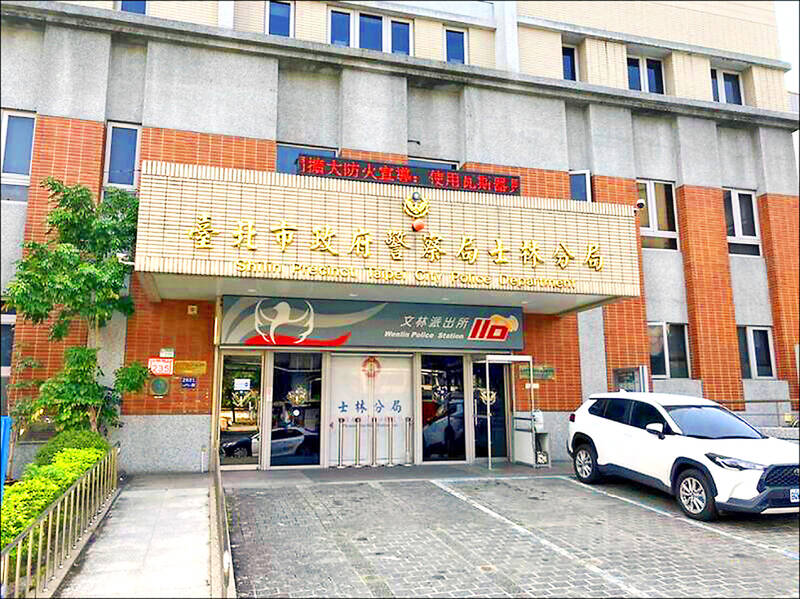A “career criminal” was arrested on Dec. 21 by Taipei police after having been on the run for 23 years, the Shilin Precinct said in a statement on Monday.
The precinct said it acted on an anonymous tip that a member of an organized crime group, surnamed Chen (陳), had been seen in Taipei’s Shilin District (士林), where he was previously known to operate.
Chen, known by the nickname “Teacher Chen,” was a career criminal who operated out of Shezi Neighborhood (社子), it said.

Photo: Taipei Times file
Chen was heavily involved with loan shark and debt collecting operations, but he went on the run on Dec. 10, 1999, after he and an accomplice allegedly shot a person in a karaoke bar, killing them, it said.
After a warrant was issued in 2000, Chen evaded arrest for 23 years, showing an understanding of police techniques that enabled him to move between New Taipei City and Taoyuan, it said.
Chen never carried identification, had no fixed residence, generally only went out at night to avoid being seen and only traveled by walking or cycling, it said.
However, in the past two years, he began to operate out of Shezi again, likely because the statute of limitations was about to expire on his warrant and because he had been away from the area he was familiar with for an extended period while refraining from contacting acquaintances, police said.
The precinct said that its chief, Huang Shwei-uain (黃水願), established a special taskforce in response to the sighting of Chen.
The taskforce collected enough evidence to arrest Chen on Dec. 21 when he was dining with friends, it said.
As there was no photograph of Chen on file, police had to take his fingerprints to confirm his identity for the arrest, upon which he was transferred to the prosecutors’ office on suspicion of murder, it added.

SHIPS, TRAINS AND AUTOMOBILES: The ministry has announced changes to varied transportation industries taking effect soon, with a number of effects for passengers Beginning next month, the post office is canceling signature upon delivery and written inquiry services for international registered small packets in accordance with the new policy of the Universal Postal Union, the Ministry of Transportation and Communications said yesterday. The new policy does not apply to packets that are to be delivered to China, the ministry said. Senders of international registered small packets would receive a NT$10 rebate on postage if the packets are sent from Jan. 1 to March 31, it added. The ministry said that three other policies are also scheduled to take effect next month. International cruise ship operators

NUMBERS IMBALANCE: More than 4 million Taiwanese have visited China this year, while only about half a million Chinese have visited here Beijing has yet to respond to Taiwan’s requests for negotiation over matters related to the recovery of cross-strait tourism, the Tourism Administration said yesterday. Taiwan’s tourism authority issued the statement after Chinese-language daily the China Times reported yesterday that the government’s policy of banning group tours to China does not stop Taiwanese from visiting the country. As of October, more than 4.2 million had traveled to China this year, exceeding last year. Beijing estimated the number of Taiwanese tourists in China could reach 4.5 million this year. By contrast, only 500,000 Chinese tourists are expected in Taiwan, the report said. The report

Temperatures are forecast to drop steadily as a continental cold air mass moves across Taiwan, with some areas also likely to see heavy rainfall, the Central Weather Administration (CWA) said. From today through early tomorrow, a cold air mass would keep temperatures low across central and northern Taiwan, and the eastern half of Taiwan proper, with isolated brief showers forecast along Keelung’s north coast, Taipei and New Taipei City’s mountainous areas and eastern Taiwan, it said. Lows of 11°C to 15°C are forecast in central and northern Taiwan, Yilan County, and the outlying Kinmen and Lienchiang (Matsu) counties, and 14°C to 17°C

STEERING FAILURE: The first boat of its class is experiencing teething issues as it readies for acceptance by the navy, according to a recent story about rudder failure The Hai Kun (海鯤), the nation’s first locally built submarine, allegedly suffered a total failure of stern hydraulic systems during the second round of sea acceptance trials on June 26, and sailors were forced to manually operate the X-rudder to turn the submarine and return to port, news Web site Mirror Daily reported yesterday. The report said that tugboats following the Hai Kun assisted the submarine in avoiding collisions with other ships due to the X-rudder malfunctioning. At the time of the report, the submarine had completed its trials and was scheduled to begin diving and surfacing tests in shallow areas. The X-rudder,